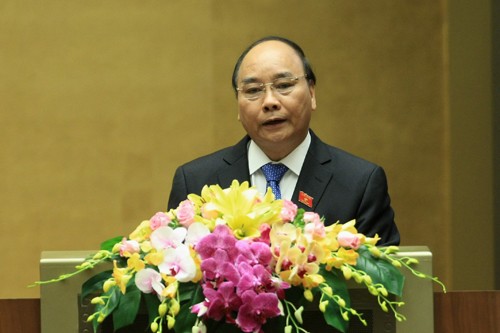(VOVworld) – Prime Minister Nguyen Xuan Phuc presented the government report on this year’s socio-economy and plans for next year at the opening of the National Assembly meeting on Thursday. He said despite several difficulties, Vietnam has achieved important results in most sectors. It has illustrated profound effort of the Party and people. Vietnam will do its best to record more impressive economic achievements in 2017.
 |
Prime Minister Nguyen Xuan Phuc presented the government report on socio-economy at the 2nd meeting of the 14th National Assembly
|
In 2016 besides favorable conditions, Vietnam has experienced various challenges including complications in the East Sea and extreme weather phenomena due to climate change. Natural disasters in the north, the central and central highlands region, and the Mekong Delta along with maritime pollution in 4 central provinces have hindered socio-economic development. But thanks to effort of the whole political system, Vietnam has recorded major results.
2016: Macro economy stabilized, basic balances ensured
The government has flexibly managed the macro-economy, control inflation, and enhance growth by combining financial and monetary policies and related policies. The CPI is estimated to increase 4%. Bad debts have been resolved together with measures to improve credit quality, guarantee liquidity, and safety of the whole financial system. The exchange rate, the foreign currency market, and gold market have been stable while foreign currency reserve has surpassed 40 billion USD, the highest level ever. Total state budget collection is estimated to increase 2.4%.
In 2016 the government has concentrated on resolving difficulties in production and trade to enhance economic growth. From January to September, 81,000 companies were established and over 20,000 companies resumed their operations. Economic restructuring has obtained initial results. But Prime Minister Phuc said this year’s GDP growth is predicted to be lower than the set target of 6.7%. “Despite difficulties and shortcomings, Vietnam’s socio-economy has changed positively and recorded comprehensive results. The macro-economy has been stabilized. Inflation has been controlled. Production has continued to develop. Economic restructuring has recorded some results. Private investment has changed remarkably. Social and market confidence has enhanced. Economic hubs have promoted their leading role in national economic growth. Many localities have strived to overcome their difficulties.”
2017: guaranteeing macro-economic stability to achieve 6.7% of GDP
The government aims to stabilize the macro-economy and ensure major balances of the economy by effectively managing and combining financial and monetary policies. Mr. Phuc said: “Actively, flexibly and effectively implement monetary policies; managing the interest rates in accordance with the macro-economy, inflation, and the monetary market; improving quality and ensuring credit for the economy, particularly prioritized sectors such as agriculture, rural, export, small and medium sized enterprises, support industry, and high-tech application.”
Vietnam will tighten monetary and financial policies, state budget, and minimize state expenditure. Suitable mechanisms and policies will be issued to mobilize all social resources including gold, foreign currencies, and foreign investment for infrastructure development. Mr. Phuc said: “Enhancing trade promotion, expanding export market along with building trademarks for Vietnam’s products, participating in regional and global production and value chains. Reviewing and simplifying import and export procedures, effectively implementing the national One-door policy. Supporting business in global integration, joining the ASEAN Community, and Free Trade Agreements. Developing the domestic retail market and connecting production and domestic consumption.”
The Vietnam government will continue to improve the business environment, promote growth, and fine tune mechanisms, policies, and laws. “The government submits to the National Assembly a bill on support for small and medium sized enterprises. Effectively implementing revised laws on investment and trade when they are ratified by the National Assembly. Setting specific goals for each ministry, sector, and locality to make visible changes in implementing resolution 19 on improving trade and investment environment and enhancing competitiveness.”
Economic restructuring should be carried out effectively together with shifting the growth model, improving quality, productivity, efficiency, and competitiveness. The government will issue and implement a project on reforming credit organizations and handling bad debts from 2016 to 2020.